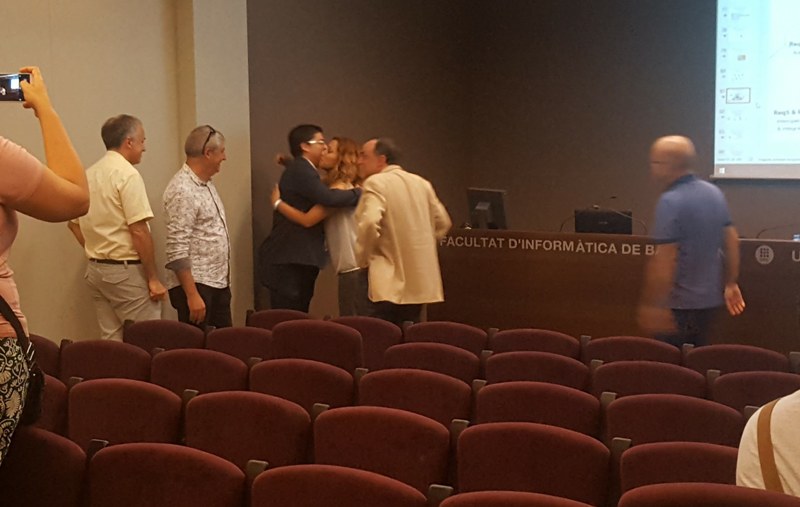Oscar Cabrera PhD thesis
Jun 19, 2017
Oscar Cabrera gets his PhD with the thesis entitled "Supporting the Context Life Cycle in Service-Oriented Computing" done with the supervision of Xavier Franch and Jordi Marco
Abstract of the thesis
Current software community players like academy and industry have been changing the traditional paradigms of software engineering towards context-awareness and distributed computing. Nowadays, service-oriented computing and context-aware computing are two emerging paradigms that are changing the way of designing, developing, providing and consuming software services. Whilst service-oriented computing is based on service-oriented architectures and it is focused on modelling functionality and providing flexible software services, context-aware computing is based on the context life cycle and it allows processing and changing the behaviour of such services given certain context information. The synergy between both paradigms is a core research topic in ubiquitous and pervasive computing widely applied to the Internet of Things and Smart Cities.In the present PhD thesis, we exploit this synergy by focusing on context-aware computing from the perspective of service-oriented computing, which is also known as context-aware service-oriented computing. Such research topic involves the management of context within different essential phases of the context life cycle that show how the context data moves from phase to phase in software services within the paradigm of the service-oriented computing. Hence, the work done in this thesis involves different components and processes that have the aim to accomplish the context life cycle, namely the acquisition, modelling, reasoning and dissemination of the context in service-oriented computing. Particularly, we make an effort to provide both a context ontology for context modelling, context reasoning and high-level context dissemination, and a context-aware monitoring architecture for context acquisition and low-level context dissemination.Such work of the thesis has been motivated for contributing in the solution of different issues mainly identified in the phases of context modelling and context acquisition that are a strong basis of the context life cycle. Firstly, in the context modelling we mainly identified the proliferation of several context models presenting some problems about: reusability, extensibility and adaptation. Secondly, in the context acquisition we mainly identified that existing monitoring infrastructures are not prepared to support the constant changes in their context and the context of other entities, including the services that they are supervising which provoke the provisioning of context data that is not reliable. In summary, this thesis explores three big research questions: 1) What context data to acquire and to model? This involves the study of the current state of the art of context models, specifically: which are these proposals and how are they related, what are their structural characteristics, what context information is the most addressed, and what are their most consolidated definitions. 2) How to model context data? This involves the development of a three-level context ontology with the aim of improving the reusability, extensibility and adaptation capabilities of existing context models. 3) How to acquire context data? This involves the development of a context-aware monitoring architecture that can be easily configured, adapted or evolved according to the constant changes of the context.The context model and the architecture proposed in this PhD thesis are validated through different scenarios and use cases, highlighting their integration in SUPERSEDE (www.supersede.eu), a European project in the H2020 program for fulfilling some requirements of data acquisition and management demonstrating that the context life cycle is supported.
PhD thesis document (to be uploaded)

Share: